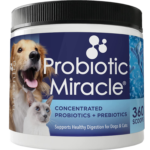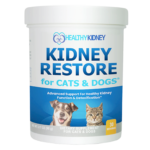Factors to consider when choosing probiotics for your pet
20 Mar 2024 | Chin

Probiotics are live organisms- known as the beneficial bacteria for the body. To date, there are many kinds of pet supplements in the market, and it is hard to choose and decide. Like human beings, owners will give their pets probiotics supplements to maintain a healthy GI tract as well as to enhance the immune system. It is also known to prevent dysbiosis, meaning the overgrowth of bad bacteria. Below are factors and concerns to consider when choosing the right probiotics for your pets:
1. CFU of probiotics- does higher CFU means good?
- Between 1 to 10 billion CFU is recommended for your pet depending on your pet’s health. Findings show that for general health maintenance, 1-4 billion CFU is effective.
- And if there are GI tract issues such as IBS, or after antibiotic treatment, a higher CFU can be given to pets.
- Based on studies, pets can take up to 200 billion CFU probiotics without any adverse effect. However, it is recommended to take the probiotics based on recommended serving.
- For CKD pets: normally higher dosage or CFU given due to dysbiosis issues and need more probiotics for metabolize uremic wastes, amount recommended may range from 15 billion CFU to 50 billion CFU per day.
2. Can we give our human-use probiotics for our pets?
- Your pet has a different digestive tract compared to humans, as the probiotic species, due to the diet they eat. It is suggested that to give your furkid probiotics made for pets.
3. Is it the more species or strain of probiotics, the better? Some formulations offer 19 species!
- More doesn’t mean good! Most studies on pets are done within the range of 5-8 species of probiotics.
- Competition may occur: Some strains are not complimentary and may compete with one another for absorption.
- Insufficient CFU amount of probiotics intake: Multi-strain formulas tend to include extremely low amounts of each probiotic strain. Your pets may not get the therapeutic amount or even the preventative benefits it needs.
4. Single species formulation, is that workable?
- For example, some of the products in the market provide only one species, such as acidophilus. It is a great species of bacteria for the gut, but it is not enough. Although, a truly high-quality strain of L. acidophilus can potentially offer more benefit for your pet than a formula with many low value species. That said, a targeted probiotic should contain more than just one species acidophilus.
- For CKD pets, it is suggested to take combination species of probiotics, recommended 3-8 species as based on research studies, as different probiotics will work differently, for example, bulgaricus reduces indoxyl sulphate (a kind of uremic wastes), and B.longum metabolizes urea.
5. Other concern in probiotic supplements?
- Prebiotics: Is a must! Prebiotics such as FOS and inulin serve as food for probiotics, to grow and multiply well in gut. Make sure any probiotic supplement you provide your pet has some form or prebiotics.
- Fillers: Avoid fillers. There are many kinds of fillers used, from natural ones (eg, pumpkin powder, liver powder) to synthetic. Natural fillers are good but some pets may be allergic to filler, for example, chicken powder. Plant based filler may contain starch too or other allergens. Some manufacturers claimed to use natural ingredients as fillers, but we are not sure are they really use that. Probiotics are best taken in its purest form.
- Flavoring and taste: adding natural flavourings are acceptable, especially for pets with CKD as they normally lack appetite. The best formulation is without flavour and taste.
- Form: Normally is powder and capsule form. Powder form normally sprinkle on foods or mix with water, and probiotics are normally microencapsulated to ensure they are delivered into the gut safely. Capsule forms are convenient but not recommended to open as some species (for eg, Streptoccocus thermophilus) will be destroyed upon contact with stomach acid. There are also in food form (like in pet food and treats), but not recommended as it is unsure how the foods are stored and handled (probiotics may be destroyed if the products are stored or transported in high temperature).
Take home messages:
For better effectiveness, it is ensuring the probiotic formulation given to your furkids are more than 2 species, but not overly many species, as more doesn’t mean better. The best formulation will be in purest form, without fillers, taste, and flavouring.
Do check out our probiotic ranges:

Probiotic Miracle
Each serving providing 1 billion CFU, 6 essential species of probiotics for pets, free of fillers, flavouring and taste.

Kidney Restore
Seven species formulation for CKD pets which help to metabolize uremic toxins, reducing the kidney’s burden.
GTF Worldwide Sdn Bhd
- No. 20-2, Plaza Danau 2, Jalan 5/109F, Taman Danau Desa, 58100 Taman Desa, Kuala Lumpur, Malaysia.
- (03) 7982 9881
- (012) 483 5523
- info@gtf.com.my
